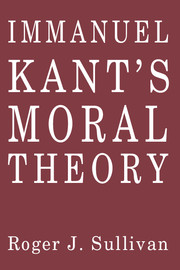Book contents
- Frontmatter
- Contents
- Preface
- Key to abbreviations and translators
- 1 Introduction
- 2 The context for Kant's moral philosophy
- Part I The nature of morality
- Part II The moral norm for persons
- Part III The norm for moral judgment
- Part IV Kant on history, politics, and religion
- 16 Autonomy and the state
- 17 Civil justice and republicanism
- 18 Kant's philosophy of religion
- Appendixes
- Notes
- Bibliography
- Index of names
- Index of subjects
17 - Civil justice and republicanism
Published online by Cambridge University Press: 05 June 2012
- Frontmatter
- Contents
- Preface
- Key to abbreviations and translators
- 1 Introduction
- 2 The context for Kant's moral philosophy
- Part I The nature of morality
- Part II The moral norm for persons
- Part III The norm for moral judgment
- Part IV Kant on history, politics, and religion
- 16 Autonomy and the state
- 17 Civil justice and republicanism
- 18 Kant's philosophy of religion
- Appendixes
- Notes
- Bibliography
- Index of names
- Index of subjects
Summary
The third formula of the Categorical Imperative reminds us that because we are social beings with intertwined moral destinies, we have a special obligation to promote and participate in a political form of the kingdom of ends. But just as moral motives could not be counted on to motivate people to leave the state of nature, so also they cannot be counted on to motivate citizens to obey civil laws. (See P.P. 371.) Even the best possible state must therefore exercise coercion to enforce its laws, by attaching penalties to their violations. (See M.M. 219, 228.) But only external actions can be legislated by a state, not their inner structure. Kant therefore distinguishes, particularly in his Metaphysics of Morals, between the “doctrine of right” (Rechtslehre), or jurisprudence, and the “doctrine of virtue” (Tugendlehre), or ethics, strictly speaking. Both are parts of moral philosophy, for each rests finally on the Law of Autonomy, but they are differentiated mainly by the kind of constraint possible in each. (See M.M. 220.)
The doctrine of virtue concerns what Kant calls “duties of inner freedom” and “duties of virtue” (Tugendpflichten). These are obligations to respect morally obligatory ends and to do one's duty from the specifically ethical motive of dutifulness. (See, e.g., M.M. 214, 219–20, 231, 239, 379–83, 389, 394, 406, 410; Lect. 273/34–35.) They therefore depend on our own voluntary self-legislation and self-constraint. (See, e.g., M.M. 238n; Lect. 273/34–35, 433/212.)
- Type
- Chapter
- Information
- Immanuel Kant's Moral Theory , pp. 246 - 260Publisher: Cambridge University PressPrint publication year: 1989



